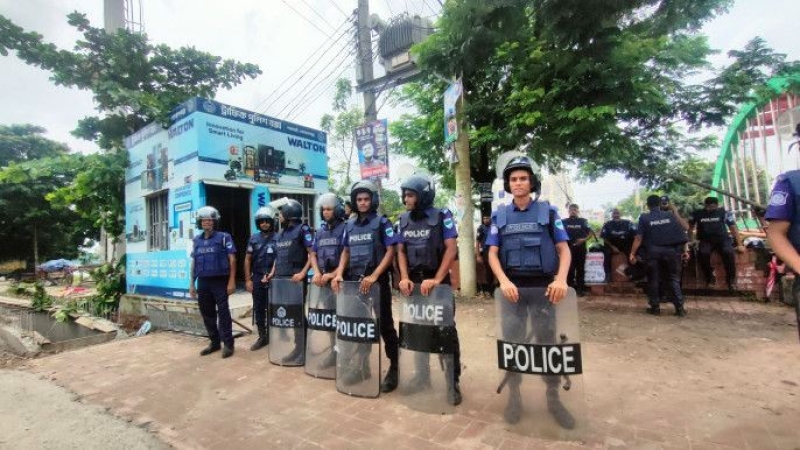- Puppet show enchants Children as Boi Mela comes alive on day 2 |
- DSCC Admin Salam’s drive to make South Dhaka a ‘clean city’ |
- 274 Taliban Dead, 55 Pakistan Troops Killed |
- Now 'open war' with Afghanistan after latest strikes |
- Dhaka's air quality fourth worst in world on Friday morning |
Gopalganj Violence Uncovers the Demon of Disinformation
Threatens to Derail Democratic Renewal in Bangladesh

Police on guard in Gopalganj on Wednesday 16 July 202.
As Bangladesh stands on the threshold of a significant democratic transition, the surge of disinformation threatens to derail progress, incite violence, and distort public discourse. The violent incident in Gopalganj on July 16 serves as a grave reminder of how fabricated narratives can spark deadly outcomes in a politically tense atmosphere.
The National Citizens' Party (NCP) had organized a peaceful rally under its “July March to Build the Nation” campaign, but before reaching the venue, social media was flooded with false claims that the party aimed to demolish the mausoleum of Sheikh Mujibur Rahman in nearby Tungipara. The provocative lie gained traction through references to the past demolition of the Dhanmondi residence of the late Awami League leader. Fueled by outrage, protesters mobilized swiftly, leading to a violent clash that claimed four lives, injured dozens, and forced the imposition of curfew and military deployment. The attack included bombings, road blockades, and arson—escalating to a level few anticipated.
The Press Secretary to Chief Adviser Dr. Yunus informed the media that at least two social media posts deliberately used unrelated old images to stoke public anger. One featured a wounded teenager from unrest in August 2024, while another was lifted from a 2022 BNP rally stormed by law enforcers—both repurposed to falsely depict the July violence. These posts were weaponized not merely to mislead, but to inflame tensions and polarize the public.
Disinformation is hardly new to Bangladesh. In 2023, AFP documented over 700 fake news stories praising the then government’s work while discrediting opposition forces. The tactics have only grown more sophisticated—with digital platforms now enabling rapid amplification, and technologies like AI-generated content blurring the line between reality and fabrication.
This climate of misinformation erodes trust in institutions and intensifies partisan divides. In a country where media literacy is still developing and access to credible sources can be limited, disinformation creates fertile ground for communal unrest and democratic setbacks.
As the nation pursues democratic renewal, countering disinformation is not optional—it’s essential. Citizens must be empowered to critically assess content, and social media platforms must be held to stricter moderation and transparency standards. Independent fact-checking organizations such as Rumor Scanner have already identified over 800 misinformation cases in early 2025 alone. Their work underscores the urgent need for civic vigilance and institutional neutrality.
The July 16 incident is more than a tragic eruption of violence—it’s a clarion call. If disinformation remains unchecked, it will vitiate the political atmosphere and imperil the democratic transition. Bangladesh must confront this challenge head-on, defending not only its people, but the integrity of its future.
Truth is not just a shield—it is the foundation upon which democracy stands.

